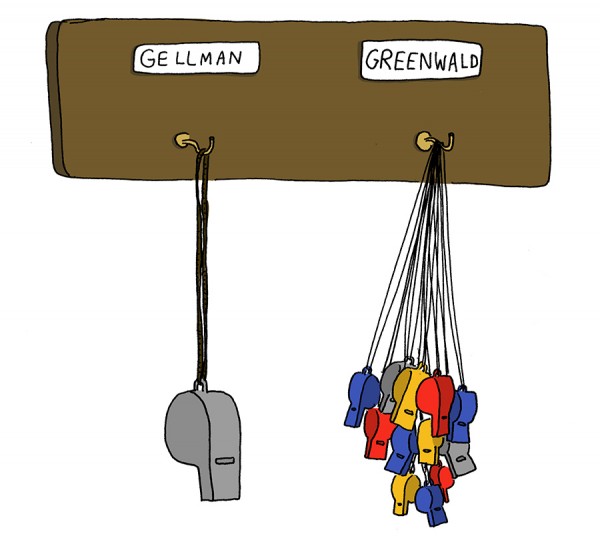DAVID SIROTA: In this new reality, ancient sclerotic news organizations that were fat and happy in the old oligopolistic system will no longer get to retain relevance, audience share, and profits by sole virtue of their masthead. With the Internet allowing anyone like Greenwald to publish anything at anytime from anywhere, and with news consumers now getting so much of their news online, the infrastructural and capital costs that once protected the oligopolists from competition are now a liability for them because those expenses are no longer a necessary cost of entry into the media market. That means the oligopolists will actually have to compete with the Greenwalds rather than just ignoring them — and that means some of them will probably lose to the Greenwalds and the upstart media organizations that employ them.
In this new reality, reporters that glided by on their publications’ brand recognition and all the TV bookings that come with it may actually have to do real work — yes, they will actually have to innovate and produce compelling content if they hope to compete with a generation of Greenwalds and retain their long-term employability.
In this new reality, the independent adversarial journalist like Greenwald who digs up genuine scoops finally has a chance to become more important than what the watchdog group Fairness and Accuracy in Media rightly calls the “state-identified journalist” who simply transcribes the claims of the rich and powerful.
In this new reality, all kinds of content producers in all different kinds of media — whether Greenwald, Glenn Beck, Katie Couric, Nate Silver or anyone else with a loyal audience — can have greater negotiating power over media owners, because in the digital age, those producers need any single one of those middlemen owners far less for audience share and exposure than they ever have. This is less disempowered freelancing and more digital-age free agency for content producers — with all the connotations about empowerment that the term “agency” comes with. Media owners and corporate media shareholders no doubt hate the thought of that just as much as they hate the thought of unions and workers having serious bargaining power.
In this new reality, governments have far less power to stop the release of humiliating information by, say, drilling holes in the hard drives of one particular media outlet. There are now so many different channels to release information — and information can now go viral no matter where it appears — that such heavy handed tactics seem less like dystopian sci-fi than absurdist comedy. That clearly pisses off — and scares — the keepers of secrets in the White House, the NSA and the GCHQ. MORE

